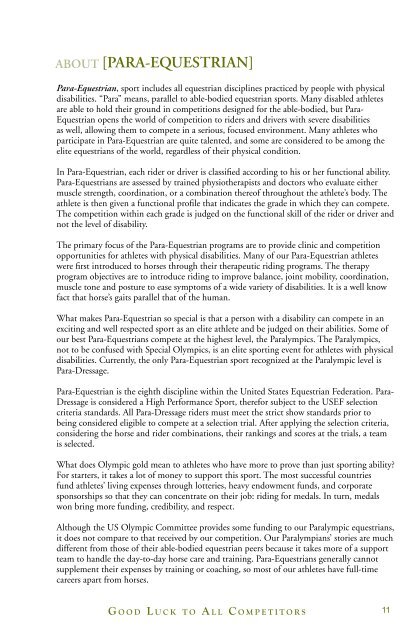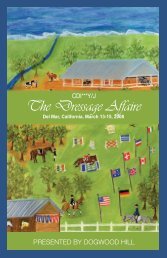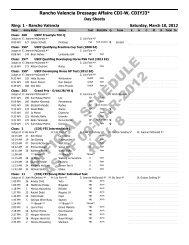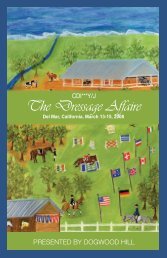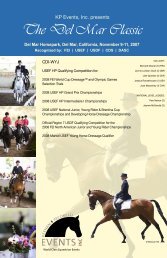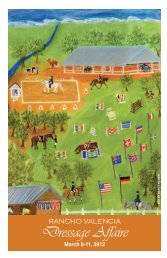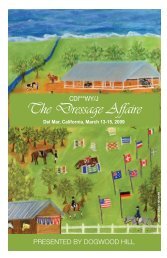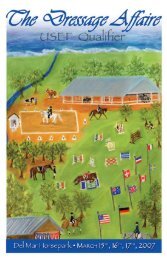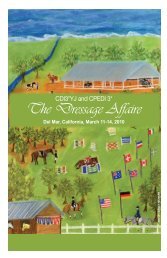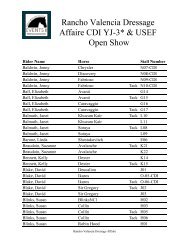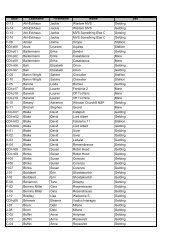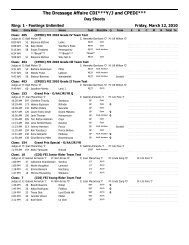The Dressage Affaire - 2011 Show Program
The Dressage Affaire - 2011 Show Program
The Dressage Affaire - 2011 Show Program
Create successful ePaper yourself
Turn your PDF publications into a flip-book with our unique Google optimized e-Paper software.
ABOUT [Para-Equestrian]<br />
Para-Equestrian, sport includes all equestrian disciplines practiced by people with physical<br />
disabilities. “Para” means, parallel to able-bodied equestrian sports. Many disabled athletes<br />
are able to hold their ground in competitions designed for the able-bodied, but Para-<br />
Equestrian opens the world of competition to riders and drivers with severe disabilities<br />
as well, allowing them to compete in a serious, focused environment. Many athletes who<br />
participate in Para-Equestrian are quite talented, and some are considered to be among the<br />
elite equestrians of the world, regardless of their physical condition.<br />
In Para-Equestrian, each rider or driver is classified according to his or her functional ability.<br />
Para-Equestrians are assessed by trained physiotherapists and doctors who evaluate either<br />
muscle strength, coordination, or a combination thereof throughout the athlete’s body. <strong>The</strong><br />
athlete is then given a functional profile that indicates the grade in which they can compete.<br />
<strong>The</strong> competition within each grade is judged on the functional skill of the rider or driver and<br />
not the level of disability.<br />
<strong>The</strong> primary focus of the Para-Equestrian programs are to provide clinic and competition<br />
opportunities for athletes with physical disabilities. Many of our Para-Equestrian athletes<br />
were first introduced to horses through their therapeutic riding programs. <strong>The</strong> therapy<br />
program objectives are to introduce riding to improve balance, joint mobility, coordination,<br />
muscle tone and posture to ease symptoms of a wide variety of disabilities. It is a well know<br />
fact that horse’s gaits parallel that of the human.<br />
What makes Para-Equestrian so special is that a person with a disability can compete in an<br />
exciting and well respected sport as an elite athlete and be judged on their abilities. Some of<br />
our best Para-Equestrians compete at the highest level, the Paralympics. <strong>The</strong> Paralympics,<br />
not to be confused with Special Olympics, is an elite sporting event for athletes with physical<br />
disabilities. Currently, the only Para-Equestrian sport recognized at the Paralympic level is<br />
Para-<strong>Dressage</strong>.<br />
Para-Equestrian is the eighth discipline within the United States Equestrian Federation. Para-<br />
<strong>Dressage</strong> is considered a High Performance Sport, therefor subject to the USEF selection<br />
criteria standards. All Para-<strong>Dressage</strong> riders must meet the strict show standards prior to<br />
being considered eligible to compete at a selection trial. After applying the selection criteria,<br />
considering the horse and rider combinations, their rankings and scores at the trials, a team<br />
is selected.<br />
What does Olympic gold mean to athletes who have more to prove than just sporting ability?<br />
For starters, it takes a lot of money to support this sport. <strong>The</strong> most successful countries<br />
fund athletes’ living expenses through lotteries, heavy endowment funds, and corporate<br />
sponsorships so that they can concentrate on their job: riding for medals. In turn, medals<br />
won bring more funding, credibility, and respect.<br />
Although the US Olympic Committee provides some funding to our Paralympic equestrians,<br />
it does not compare to that received by our competition. Our Paralympians’ stories are much<br />
different from those of their able-bodied equestrian peers because it takes more of a support<br />
team to handle the day-to-day horse care and training. Para-Equestrians generally cannot<br />
supplement their expenses by training or coaching, so most of our athletes have full-time<br />
careers apart from horses.<br />
G o o d Lu c k t o al l Co m p e t i t o r s 11


